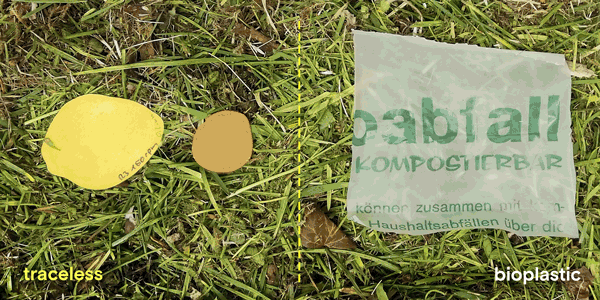

PIONEERING A
NEW GENERATION
OF MATERIALS


We have developed a new kind of material, based on agricultural plant leftovers - working with nature, not against it. With our material innovation, we're building a circular, bio-based future and supporting the transition to decarbonization.
WE USE PLANT RESIDUES
TO CREATE A NOVEL GENERATION OF BIOMATERIALS
traceless® materials can replace plastics in applications that are hard to recycle or easily to end up in the environment - such as single-use items, packaging, paper coatings or adhesives. Our materials enable converters to produce regenerative, nature-based products that work like plastic, but disappear like nature.
FOR NATURALLY
REGENERATIVE PRODUCTS
Using our innovative, patented process technology, we produce traceless® materials. Made from unmodified natural polymers, they are certified plastic-free, yet can be processed using standard technologies such as injection moulding or extrusion - enabling converters to manufacture a wide range of end products.



Due to their natural composition, traceless® materials break down under natural composting conditions into water, humus and CO₂ within just a few weeks — offering a truly sustainable solution for a world free of pollution and waste. In other waste streams, they won’t affect recyclability, and release only the renewable carbon absorbed by plants during growth. This way, traceless® supports a fully natural carbon cycle.
DESIGNED TO LEAVE NO TRACE

— FOR RESOURCE EFFICIENCY
traceless® materials are based on agricultural residues. They are 100% biobased, fossil-free, and don’t compete with food production or cause deforestation.
MADE FROM
PLANT LEFTOVERS
— NOT LEAVING A TRACE
Certified home compostable (NF T 51-800), traceless® breaks down within 2–9 weeks under natural conditions. It’s safe in all waste streams, supporting a closed carbon cycle.
NATURALLY COMPOSTABLE
— PROTECTING PEOPLE
& PLANET
Certified 100% plastic-free (Flustix) and free of PFAs and harmful chemicals, traceless® uses only environmentally safe ingredients in product and production process — safe for people and the environment.
PLASTIC- &
PFAS-FREE
— FOR A LOWER FOOTPRINT
Made from renewable, non-fossil raw material and produced resource-efficiently, traceless® cuts emissions by up to 76% over its whole lifecycle and 95% in production and disposal compared to virgin plastics.
CLIMATE
FRIENDLY
— MAXIMIZING IMPACT
With plastic-like performance and compatibility with standard production methods, traceless® is scalable, cost-competitive, and ready for industrial use.
SCALABLE & COMPETITIVE
BASED ON NATURAL POLYMERS
traceless® materials pioneer a new generation of natural biomaterials based on natural polymers, and leave behind the familiar categories of plastics and bioplastics.
They are not only bio-based, but even biobased on leftovers, namely plant residues of agricultural industry. For biodegradation, they don‘t need industrial composting conditions, but are certified home compostable.

The secret key for traceless®' excellent compostability: Natural polymers! Because nature has produced them, the natural microorganisms out there already know how to handle them, and can easily digest them.
Under natural composting conditions like on a home compost, composting takes only 2-9 weeks, depending on the thickness of the material. traceless® is certified home compostable.
Composting test of traceless material (left, thickness 0,2 and 1,6mm), compared to a film cutout of a commercially available organic waste bag (right, thickness 0,03mm, certified EN13432 compostable).




















